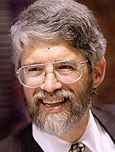 I watched Stephen Sackur interview James Lovelock on the BBC’s Hard Talk programme on Tuesday evening. It was a depressing experience. Lovelock largely reiterated the things he said in The Vanishing Face of Gaia, reported in my review here.  I listened to it all again. His familiar and seemingly detached expectation that most of the human race will be extinguished  this century. His strong distaste for green solutions, especially wind power. His conviction that all our efforts should now be directed to preparing for life in a diminished world, and that the more time we waste on silly ideas like renewable energy the worse things will be in the end. At present countries like the UK can and should provide a haven for refugees from hotter climates, but there will come a time when the lifeboat is full. I’m not sure how he envisages events unfolding at that point.
I watched Stephen Sackur interview James Lovelock on the BBC’s Hard Talk programme on Tuesday evening. It was a depressing experience. Lovelock largely reiterated the things he said in The Vanishing Face of Gaia, reported in my review here.  I listened to it all again. His familiar and seemingly detached expectation that most of the human race will be extinguished  this century. His strong distaste for green solutions, especially wind power. His conviction that all our efforts should now be directed to preparing for life in a diminished world, and that the more time we waste on silly ideas like renewable energy the worse things will be in the end. At present countries like the UK can and should provide a haven for refugees from hotter climates, but there will come a time when the lifeboat is full. I’m not sure how he envisages events unfolding at that point.
Author: Bryan Walker
Holdren’s high hopes for China
 Physicist John Holdren is President Obama’s chief science advisor and director of the White House Office of Science and Technology Policy. Interviewed recently for Yale’s Environment 360 by Elizabeth Kolbert, he stuck to the theme that the administration plans to convert the U.S. “from the laggard that it has been in this domain†into “the leader that the world needs†on global warming. In a lengthy interview his comments on China struck me as particularly significant at this stage of international discussions. He has recently visited China with Todd Stern, the Secretary of State’s Special Envoy on Climate Change. Kolbert asked him to speak about what he heard from the Chinese and what he thought the U.S. can do to persuade countries like China and India to agree to some action that will be politically palatable at the Copenhagen conference. Continue reading “Holdren’s high hopes for China”
Physicist John Holdren is President Obama’s chief science advisor and director of the White House Office of Science and Technology Policy. Interviewed recently for Yale’s Environment 360 by Elizabeth Kolbert, he stuck to the theme that the administration plans to convert the U.S. “from the laggard that it has been in this domain†into “the leader that the world needs†on global warming. In a lengthy interview his comments on China struck me as particularly significant at this stage of international discussions. He has recently visited China with Todd Stern, the Secretary of State’s Special Envoy on Climate Change. Kolbert asked him to speak about what he heard from the Chinese and what he thought the U.S. can do to persuade countries like China and India to agree to some action that will be politically palatable at the Copenhagen conference. Continue reading “Holdren’s high hopes for China”
Aquaflow’s Aussie adventure
 Blenheim company Aquaflow, appropriately, is not standing still. BusinessGreen reports it has embarked on a fund-raising programme in Australia to attract financing for the first of up to 16 pilot plants to demonstrate its algae fuel technology. For those who aren’t familiar with the enterprise, it extracts wild algae at the point of discharge from the Marlborough sewage ponds as a feedstock for biofuels, and in the process produces a much-improved water quality to the extent that it meets standards for irrigation use. By comparison with some of the overseas ventures which select and contain the algae it’s low tech, with a low capital requirement, albeit with a lower fuel yield. And it’s authentically renewable, which cannot be said of some processes which are using CO2 from fossil fuel burning to enhance the growth of the algae. (Hot Topic has carried reports of the company’s activity here and here and here.)
Blenheim company Aquaflow, appropriately, is not standing still. BusinessGreen reports it has embarked on a fund-raising programme in Australia to attract financing for the first of up to 16 pilot plants to demonstrate its algae fuel technology. For those who aren’t familiar with the enterprise, it extracts wild algae at the point of discharge from the Marlborough sewage ponds as a feedstock for biofuels, and in the process produces a much-improved water quality to the extent that it meets standards for irrigation use. By comparison with some of the overseas ventures which select and contain the algae it’s low tech, with a low capital requirement, albeit with a lower fuel yield. And it’s authentically renewable, which cannot be said of some processes which are using CO2 from fossil fuel burning to enhance the growth of the algae. (Hot Topic has carried reports of the company’s activity here and here and here.)
Prescott presses climate case
 Tony Blair is not the only former UK Labour Party leader to seek to influence the direction of the climate change talks. John Prescott, former Deputy Prime Minister, is deeply involved in trying to secure a successor to Kyoto. A Guardian article reports on his efforts and his views, both of which I found heartening.
Tony Blair is not the only former UK Labour Party leader to seek to influence the direction of the climate change talks. John Prescott, former Deputy Prime Minister, is deeply involved in trying to secure a successor to Kyoto. A Guardian article reports on his efforts and his views, both of which I found heartening.
Technology to break climate deadlock
 Reports timed to influence the approach to Copenhagen are continuing to appear. The latest, launched a few days ago by Tony Blair, is Breaking the Climate Deadlock: Technology for a Low Carbon Future. It comes from the The Climate Group in partnership with The Office of Tony Blair. The Climate Group is an international NGO which focuses on speeding up the shift to a low carbon economy. Its members are large businesses and government entities at city, state and regional levels who have signed up to a set of principles which fully recognise the seriousness of human-caused climate change and the urgency of the need to address it. The report was prepared by E3G, another NGO which works to deliver outcomes with strategic significance for the transition to sustainable development. Continue reading “Technology to break climate deadlock”
Reports timed to influence the approach to Copenhagen are continuing to appear. The latest, launched a few days ago by Tony Blair, is Breaking the Climate Deadlock: Technology for a Low Carbon Future. It comes from the The Climate Group in partnership with The Office of Tony Blair. The Climate Group is an international NGO which focuses on speeding up the shift to a low carbon economy. Its members are large businesses and government entities at city, state and regional levels who have signed up to a set of principles which fully recognise the seriousness of human-caused climate change and the urgency of the need to address it. The report was prepared by E3G, another NGO which works to deliver outcomes with strategic significance for the transition to sustainable development. Continue reading “Technology to break climate deadlock”
